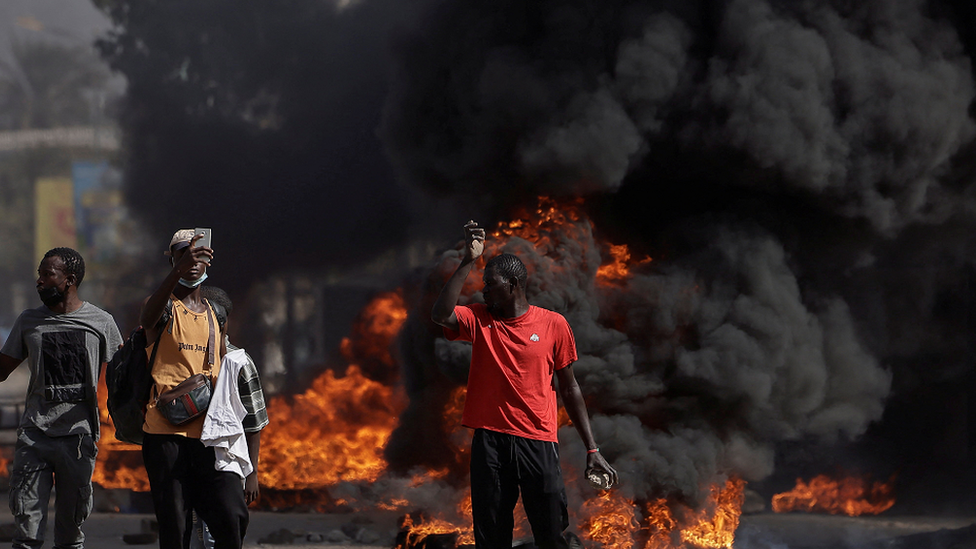Senegal election: Court blocks President Macky Sall's bid to delay poll
- Published

There have been protests in Senegal following the announcement that the presidential election would be delayed
The decision to postpone this month's presidential election in Senegal was against the constitution, the country's top court has ruled.
The Constitutional Council annulled both President Macky Sall's decree and a contentious bill passed by parliament moving the vote to December.
Widespread protests have gripped the West African country, once considered a bastion of stability in the region.
A leading opposition figure hailed the ruling as "a great day for democracy".
"We've been so ashamed by all this violation of the law and the constitution," Aminata Touré, a former prime minister and now opposition figure, told the BBC's Newsday programme.
Anta Babacar, the only female candidate, agreed.
"We are actually very, very proud of our Constitutional Council and it shows that there is at least a little bit of democracy and justice that's left in our country," she said.
The priority now was to set a new election date, she added in an interview with the BBC.
On 3 February, Mr Sall announced he was pushing back the election date - originally scheduled for 25 February - because of concerns over the eligibility of opposition candidates.
His proposal was supported by 105 out of the 165 MPs after a fiery debate which saw police remove some opposition MPs from the chamber. A six-month postponement was originally proposed, but a last-minute amendment extended it to 10 months, meaning a new election date of 15 December.
Mr Sall had reiterated that he was not planning to run for office again. But his critics accused him of either trying to cling on to power or unfairly influencing whoever succeeds him.
Both the US and EU had urged Mr Sall to reconsider.
Opposition candidates and lawmakers filed a number of legal challenges.
Khalifa Sall, a leading opponent and a former mayor of the capital Dakar, who is not related to the president, had called the delay a "constitutional coup", while Thierno Alassane Sall, another candidate, also no relation, called it "high treason".
Referring to when voting should take place, the Constitutional Council said it was "impossible" for the election to be held on the original date but urged authorities to organise it "as soon as possible".
Mr Sall is yet to react to the ruling, however a government spokesperson said it had been "noted".
The president's second term expires on 2 April.
While the election could be held before then, the disputes that led to the polls being postponed in the first place remain unresolved, including allegations of corruption in the Constitutional Council and objections from opposition figures who had been excluded from the candidate list published last month.
Holding the election using the disputed candidate list could spark renewed unrest and violence by supporters of those barred from contesting, in particular Ousmane Sonko, who has a large and vocal following among young Senegalese.
Most candidates have not been campaigning since President Sall issued his decree earlier this month, hours before campaigns were meant to kick off.
The court decision came on the same day as several opposition politicians and civil society members were released from prison, in what some in the country viewed as a move to appease public opinion.
Senegal had long been seen as one of the most stable democracies in the region. It is the only country in mainland West Africa that has never had a military coup. It has had three largely peaceful handovers of power and until earlier this month had never delayed a presidential election.
Watch: The president who vowed to play by the rules but isn't